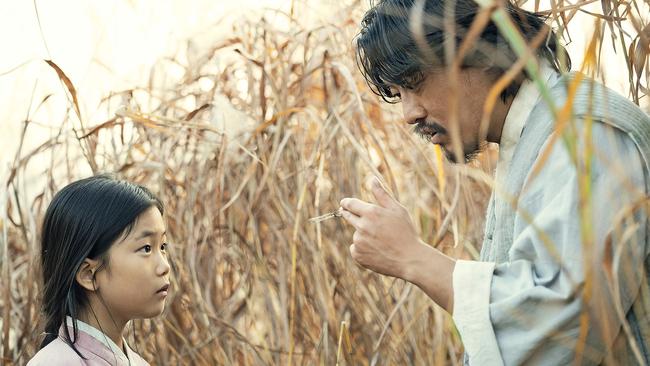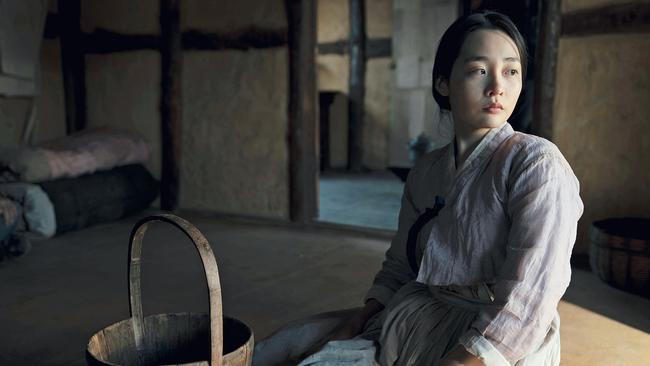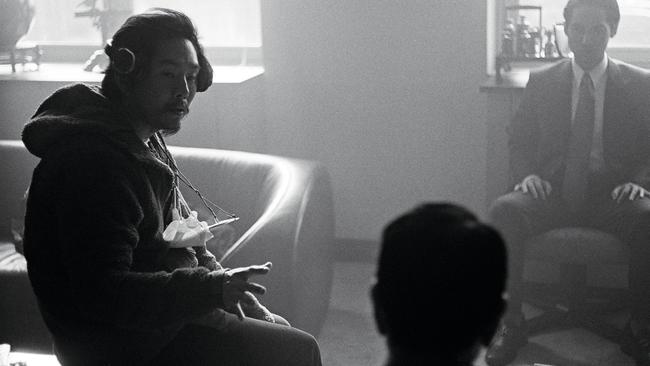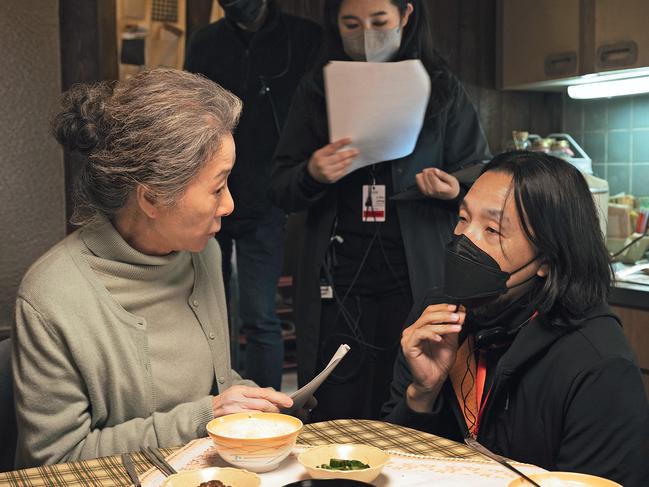The unique collaboration enlivens the sublime new series, Pachinko
Working together on the immersive screen adaptation of the bestselling book Pachinko gave two directors the opportunity to explore their own Korean heritage.

There are two distinct visual styles in the new miniseries Pachinko. AppleTV+’s adaptation of the beloved 2017 novel by Min Jin Lee confronts the beauty, pain and struggle of one family’s journey over four generations, following them from Japanese-occupied Korea in the 1920s to the bustling metropolis of 80s Tokyo.
Four episodes were directed by the painterly filmmaker Kogonada and four by the bolder, more dramatic Justin Chon: two of the most exciting Korean-American directors working today. “Our collaboration wasn’t necessarily verbal, it was voodoo,” muses Chon.
Many would recognise Chon as Eric from Twilight, but in the years since his boy-band haircut graced the screen, Chon has undergone a transformation. Now, he’s the tattooed indie director setting the film world alight with projects about the immigrant experience including last year’s Blue Bayou, in which he starred alongside Alicia Vikander.
In contrast, no one has ever really known who Kogonada – a pseudonym for the largely anonymous filmmaker – is. His moniker first appeared under video essays dissecting the work of directors such as Wes Anderson and Stanley Kubrick. But he now directs gorgeous art house films, including 2017’s Columbus and this month’s After Yang, starring Colin Farrell and Jodie Turner-Smith.
Working together on Pachinko gave both the opportunity to explore their own Korean heritage while presenting their unique styles to the world, as they explain in conversation with Vogue Australia.

KOGONADA: “How did you end up doing Pachinko?”
JUSTIN CHON: “I had always wanted to do it after reading the pilot [script]. How was it for you?”
K: “I was really hesitant, partly about going into a TV space. Film was something I knew and felt really comfortable with. Then part of my resistance was because the story feels so personal. It felt like I would have to excavate things that I know are a part of my history, a part of my life. Korea has always been this place for me that my dad was running away from. He grew up in Japan as well and he has such a conflicted relationship with both of those countries. But, at one point I just thought, ‘I need to face this.’“
JC: “Do you feel, after having gone through it, that you did have some understanding about the things your father ran away from?”
K: “I’m still processing it, but yes, for sure. My dad had a difficult childhood, both in Korea and in Japan, so just to film in a space like that, to film in this kind of house that he had often described, that I never could wrap my mind around – I felt it in that tangible way, and also my own sense of Koreanness and Asianness.”
JC: “One of the reasons I took the job was because it’s a learning experience. Every project I do, I’m trying to be empathetic and learn something about a certain type of people or trying to empathise with even myself. My understanding of being Korean, who I am and where my parents came from, is on a very superficial level. I’ve heard stories about what my grandmother went through, and she told me all sorts of crazy shit. But this was a chance for me to be thrown into that. I’m probably more aligned with you than even I knew because being there, the sites were familiar – I had gone to these villages when I was a kid – but to actually put myself in the shoes of what it was like, I wasn’t prepared for it either.”

K: “There was a moment when you realise Pachinko is about the diaspora. It’s about people who had to leave Korea and then try to make sense of it. And I thought that this is our story as well, because if you’ve lived in Korea all your life, it’s your story, but there is something about leaving that country and trying to make sense of your history. There was a moment when you’re like, ‘God, am I Korean enough to tell this story?’ And then you realise, this is the story of people who went to Japan, had to ask that same question and tried to make sense of it.”
JC: “This is our story in the sense that we’re a few generations after our parents left their mother country. I really started to think, ‘This family, they’re in Japan. They’ll never fully be Japanese, but they’re no longer Korean either.’ And for myself, being born and raised in the US, I feel that a lot, too … [In Pachinko] seeing this family now, three, four generations in, you start to really think about, ‘What does that mean? Where do we belong? Where’s our place? And what’s the future?’ In that way, with Pachinko, it’s any immigrant, anywhere.”
K: “In many ways, I feel like you’re the perfect person for Pachinko because your works from Gook, to Ms. Purple, to Blue Bayou, tackle this subject. I feel like you’re a very specific Asian-American voice that is very exciting … And I think we represent a spectrum of Asian cinema. The last thing I wanted to do [on Pachinko] is for us to not be the filmmakers we are. It aligned really well because we had episode four [to handover], and there’s a different energy to the whole story, they’re about to go to Japan, and I was so excited to pass the baton. Most series try to create one voice. But I was very excited about providing the spectrum of Asian-American cinema.”
JC: “I was so excited to work with you because we are pretty damn different in terms of the diaspora of filmmaking, right? For that to be combined in a single series, and for it to work, is pretty brilliant.”
K: “Our filmmaking is conversing with one another. That was exciting. I feel challenged by you. In Blue Bayou when you run and slide on your knees to your daughter at the end, I get that!”

JC: “There are certain things I can’t help – the running and the sliding, some people think it’s too much. And, when I look at your films, I’m like, ‘Wow.’ You leave so much space for me to examine myself. That is the incredible difference. With Columbus, I can never forget that shot where it was just static with [star] John [Cho] in that tiny mirror. In one frame, you’re seeing so much. It’s like a magic trick. It’s: ‘Okay, K knows how to do this in a way that is truly magical to me.’ That’s why filmmaking is so exciting, because there’s no right way to do it. This collaboration is really a blessing because we had this opportunity to do it our way, but exist in the same universe. But it wasn’t a collaborative effort where we have meetings. It was just: ‘Okay. What needs to get done?’ And it was about decision-making on both parts, which allowed us to move forward constantly.”
K: “I think that’s the advantage of having two independent filmmakers because we’ve made things with far less. We’re both used to pivoting, and, because we’re both writers as well, rewriting. But it was layers of collaboration, and that was maybe the most challenging thing. When you’re making your own film with your own little unit, you can make decisions very quickly. Here, everything was larger. There was a vision behind our vision. In that way, it was a real lesson. It feels like a miracle that we did it … Justin, you’ve been in this industry for a while, what is your assessment of how it has changed for Asian-American filmmakers? I’m curious.”
JC: “A thousand per cent it’s better, compared to 20 years ago. I started acting in 2000, and for an Asian person, it was like the Chinese delivery boy, the Chinese triad, or whatever. There are way more opportunities, but are we there yet? Of course not.”
K: “I’ve always said it’s like baseball when only white people could play, people still loved it, but it’s a far richer sport once you allow everyone to play. I’m encouraged because Parasite won Best Picture at the Oscars, Squid Game was so popular. I often look at the food world, and 20 years ago, you couldn’t go to Tennessee and order sushi. Everyone thought raw fish was grotesque. Now, you can go to any place, and there’s a sushi bar, or they’re serving ramen. It’s a matter of exposure, and I think tastes are changing. As an Asian director, you want to be able to make a film, but you don’t want it to be like, ‘I’m an Asian director, but I’m still making French food.’ I want to create some Asian flavours. And even if it’s a diverse group of actors, I don’t want to feel like I have to be a chef who makes American-style food. There is a movement, and people are having a taste for something else. And thank god. I think we need that.”
JC: “Pachinko is one of a kind. We’re talking about a story that in terms of the [entertainment] business, there’s no category for it, because it’s in three languages: Japanese, Korean and English. It spans New York, Osaka, Tokyo and Yeongdo, the southern tip of Korea. Who claims it? Who gets to say that it’s whose story? Pachinko does break that mould, and it is something that is revolutionary in terms of turning the industry on its head and showing that other things are possible.”
New episodes of Pachinko are streaming weekly on AppleTV+.
This article appears in the April issue of Vogue Australia, on sale April 4.

To join the conversation, please log in. Don't have an account? Register
Join the conversation, you are commenting as Logout